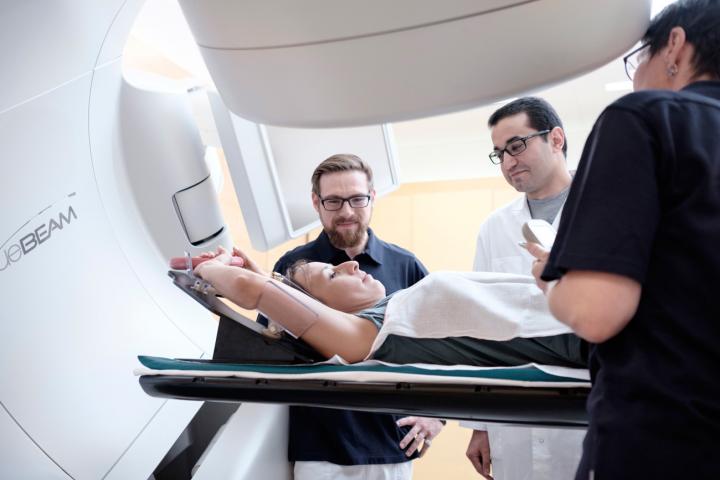
Credit: UKRO/ Insel Gruppe
Radiotherapy is a cornerstone of today’s cancer treatment. About half of all people suffering from cancer with a so-called radiotherapy. For this, patients are usually irradiated daily for several weeks. Although this therapy contributes to healing in many people, others hardly benefit from it at all. The precise causes for these differences are unclear.
Using genetic testing methods, a team led by Prof. Sven Rottenberg from the University of Bern and in close cooperation with the Netherlands Cancer Institute in Amsterdam has now identified genes that play an important role in this process.
“For many cancer patients, their relatives and treating physicians, it is incredibly frustrating when there is no success after a painstaking radiotherapy that takes weeks,” said Rottenberg. “We hope that our findings contribute to better predicting the chance of therapy success.” The findings can also be used to develop new drugs that could improve the efficacy of radiotherapy. The results of the study have been published in the Cell Reports journal.
Key genes for therapeutic success
The aim of radiation therapy is to damage the DNA of the cancer cells, i.e. their blueprint. This contains mutations that cause uncontrolled growth. The tumor growth is to be stopped by destroying the cancer cells’ DNA. But like all cells in our body, cancer cells also have the tools to repair this DNA damage. There are fundamental differences between individual cancer patients’ tumors as to which tools are available. These are related to the genes that encrypt the information for these tools. Rottenberg’s researchers used genetic screening to investigate the cancer cells’ self-repair. In the process, they encountered crucial weaknesses: If certain repair genes are missing in cancer cells, they are unable to repair themselves after irradiation. The researchers were able to prove this in an animal model as well as in human cells. If these genes are missing, there is therefore a good chance that the radiotherapy will be successful. “Our findings show the importance of personalized cancer therapy that takes the genetic predisposition of the people affected into account,” said Rottenberg.
###
Internationally networked research supported by the EU
The University of Bern founded the Center for Precision Medicine in 2019 with the aim of strengthening research into such personalized therapies. It should contribute to the development of tailor-made therapies for cancer patients. To research radiotherapy, Prof. Rottenberg’s group is not only collaborating with the Netherlands Cancer Institute but also with research groups at the University of Zurich, Oxford University and the Dana-Farber Cancer Institute in Boston.
The research by Sven Rottenberg is supported by the Swiss National Science Foundation (SNSF), the Swiss Krebsliga, the Novartis Foundation for Medical-Biological Research and the Wilhelm Sander Foundation. It also receives support from the European Research Council (ERC), which funds excellent research within the framework of Horizon 2020.
Bern Center for Precision Medicine (BCPM)
The Bern Center for Precision Medicine (BCPM) was founded in 2019 on the initiative and with the support of the Canton, the University of Bern and Inselspital, Bern University Hospital. The BCPM is active in research, networking and training.
The center is dedicated to promoting approaches in precision medicine by supporting research and development of medical diagnoses and therapeutic methods. It offers an interdisciplinary network for researchers and clinicians from various fields and faculties and unites more than 50 members. The BCPM will also provide the best possible education through graduate schools for the next generation of nurses and researchers. As a result, it is securing the long-term benefits that precision medicine brings to healthcare.
https:/
Media Contact
Sven Rottenberg
[email protected]
Original Source
https:/




